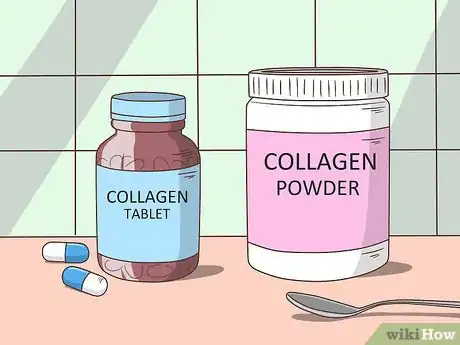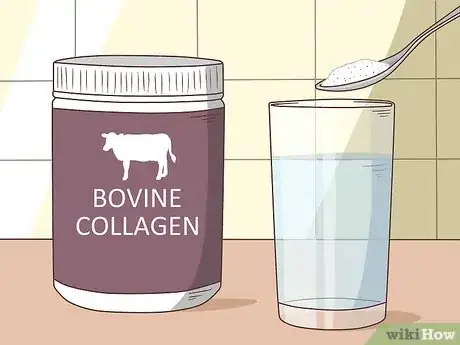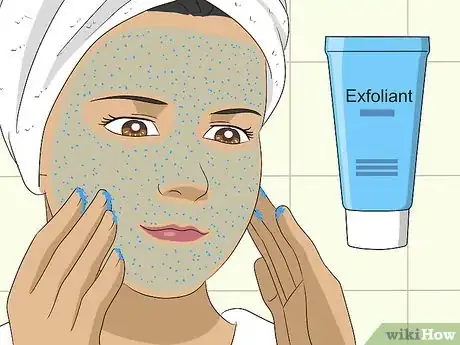This article was co-authored by Adarsh Vijay Mudgil, MD. Dr. Adarsh Vijay Mudgil is a board certified Dermatologist, Dermatopathologist, and the Owner of Mudgil Dermatology, a state-of-the-art dermatology practice based in New York, New York. As one of the few dermatologists in the area to achieve board certification in both dermatology and dermatopathology, Dr. Mudgil specializes in all aspects of medical, surgical, and cosmetic dermatology. He received his Bachelor's degree with Phi Beta Kappa honors from Emory University and earned his Doctor of Medicine (MD) with Alpha Omega Alpha honors from the Stony Brook University School of Medicine. In medical school, Dr. Mudgil was among a handful of students nationwide to receive a coveted Howard Hughes Medical Institute Fellowship and Scholarship. He then completed his residency in dermatology at the Mount Sinai Medical Center in Manhattan, where he served as chief resident. Additionally, Dr. Mudgil went on to complete a fellowship at the prestigious Ackerman Academy of Dermatopathology. He is a fellow of the American Academy of Dermatology, the American Society for Dermatologic Surgery, and the American Society of Dermatopathology. Dr. Mudgil is also a member of the Mount Sinai School of Medicine teaching faculty.
There are 17 references cited in this article, which can be found at the bottom of the page.
This article has been viewed 32,893 times.
Collagen is an important protein in your skin and connective tissues. Among its many functions, it is responsible for giving skin its strength and elasticity. Loss of collagen is a cause of wrinkles. While collagen production declines with age, you may be able to increase your body's collagen production in a variety of ways. One way to boost your body’s collagen is by eating foods that support natural collagen production. Skincare products containing antioxidants and collagen-boosting components may increase collagen in your skin, but more research is needed. You can also increase collagen by taking a supplement.
Steps
Increasing Collagen through Diet
-
1Focus on key nutrients. Certain nutrients can help your body to produce more collagen, so make sure that you are including a good balance of vitamins and minerals. Some essential nutrients for collagen production include:
- Foods containing antioxidants.[1]
- Amino acids, such as from animal products like meat, milk, and eggs.
- Proline, such as from gelatin, cottage cheese, and beef.[2]
- Anthocyanidins, such as from blue corn, eggplant, and concord grapes.[3]
- Vitamin C, such as from citrus fruits, peppers, and tomatoes.
- Copper, such as from oysters, kale, and shiitake mushrooms.[4]
- Vitamin A, such as from sweet potatoes, carrots, and dark leafy greens.[5]
-
2Add cruciferous vegetables to your diet. Cruciferous vegetables contain sulfur, which is important for collagen production. Try eating between two and three servings of sulfur-containing vegetables each day, like kale, broccoli, or cauliflower.[6]Advertisement
-
3Eat legumes. Legumes like beans and lentils also contain sulfur. Add several servings of legumes to your diet each week. Try eating beans and rice for dinner or a lentil stew for lunch. Consuming these foods can help your body optimize its collagen production.[7]
-
4Eat soy. Isoflavone-rich soy products can increase your collagen production. Soy consumption can increase in the amount of collagen in your skin. It can also boost skin elasticity. Try soy products including tempeh, tofu, soy milks, and soy cheese.[8]
-
5Add eggs to your diet. Eggs are a great source of collagen. They also provide the proper mix of amino acids needed to support the development and maintenance of connective tissue in the human body. Cooking can interfere with an egg’s membranes, so an egg collagen supplement is the best way to go. However, you can still get collagen by eating eggs.
-
6Drink plenty of water.[9] It is important that your skin and body remain hydrated if you are trying to increase your collagen production. Staying hydrated will support collagen production. Aim for at least eight 8-ounce glasses or about two liters per day.
-
7Eat plenty of foods rich in vitamin C. Vitamin C is important for collagen production in the body. The best way to get vitamin C is by eating foods rich in this important nutrient. You can get your daily dose of vitamin C by eating foods like strawberries, strawberries, and bell peppers.[10]
Boosting Collagen through Supplements
-
1Take a daily collagen supplement. Collagen supplements may help boost collagen in your body. You can opt for a supplement that comes in pill form, or for a powder that you stir with water or add to a smoothie. Make sure you take the supplement regularly for best results.[11]
- Talk to your doctor before starting to take a collagen supplement.
-
2Consider a fish collagen supplement. Collagen from fish can be quickly absorbed by the body. Because of this, it is considered one of the best sources of collagen for humans. Look for a supplement that also includes vitamin C, which will help with absorption.
-
3Try an egg-based collagen supplement. If you are a vegetarian, or if you do not want to consume a collagen supplement made from animals, you should try an egg-based alternative. These supplements are made from egg shell membranes and can help your body build collagen.[12]
-
4Take a bovine collagen supplement. These supplements are made from the skin, bones, and muscles of cows. Opt for a bovine collagen supplement that is made from grass-fed cows. If possible, go for a supplement that is also organic.[13]
-
5Consider a vitamin C supplement. While the best way to get vitamin C is through foods rich in this nutrient, you can also take a supplement. Aim for one that is food-based and contains at least 75 mg of vitamin C.[14]
Boosting Collagen with Skincare
-
1Try a facial massage. Getting a professional facial massage, or giving yourself one in the comfort of your own home, may help stimulate collagen production and boost your circulation. Try gently massaging your face with your fingertips, using gentle upward circular motions. Start at your jawline and slowly move up to your forehead.
- Try giving yourself a facial massage once per week.
-
2Consider retinol treatment.[15] Topical vitamin A, also known as retinol, might increase collagen in your skin. Talk to your doctor about a prescription for topical retinol. You can also purchase retinol treatments over the counter, but these creams and lotions will have a lower concentration of retinol in them.[16]
-
3Apply a vitamin C antioxidant cream. Antioxidant lotions, creams, and serums that contain vitamin C may increase collagen levels in your skin. Talk to your dermatologist about the best options for your skin type and texture. You can also purchase over the counter skincare products that contain vitamin C.[17]
-
4Go for skincare products that contain polypeptides. Applying products to your skin that contain polypeptides may stimulate the synthesis of collagen in your skin. Try applying a penetrating polypeptide serum before your moisturizer, or a moisturizer that contains polypeptides.[18]
- Look for a collagen stimulating polypeptide like matrixyl on your skincare product ingredients list.
-
5Try exfoliating your skin. Exfoliating your skin can help to boost collagen production as well. Try using an exfoliating facial cleanser in place of your normal cleanser once per week. You can also use an exfoliating body scrub once per week.
-
6Protect yourself from things that can deplete collagen. There are certain substances and activities that may deplete the collagen in your skin. Do your best to avoid these substances and activities. Things that may deplete collagen include:[19]
- Smoking. Quit smoking if you are a smoker! Smoking damages more than just your skin.
- Exposure to sunlight. Always wear a SPF-30 or zinc sunscreen when you spend time outside in the sun.[20] Wearing a wide brimmed hat can also help to protect the skin on your scalp and face from the sun.
- Exposure to pollution. Avoid going outside on extra smoggy days. Exposure to pollution can also deplete the collagen in your skin.
- High sugar consumption. Limit the amount of sugar in your diet to avoid depleting your skin’s collagen by consuming too much sugar.[21]
How Can I Increase The Collagen Production In My Face?
Expert Q&A
Did you know you can get expert answers for this article?
Unlock expert answers by supporting wikiHow
-
QuestionHow can I protect the collagen in my skin?
 Adarsh Vijay Mudgil, MDDr. Adarsh Vijay Mudgil is a board certified Dermatologist, Dermatopathologist, and the Owner of Mudgil Dermatology, a state-of-the-art dermatology practice based in New York, New York. As one of the few dermatologists in the area to achieve board certification in both dermatology and dermatopathology, Dr. Mudgil specializes in all aspects of medical, surgical, and cosmetic dermatology. He received his Bachelor's degree with Phi Beta Kappa honors from Emory University and earned his Doctor of Medicine (MD) with Alpha Omega Alpha honors from the Stony Brook University School of Medicine. In medical school, Dr. Mudgil was among a handful of students nationwide to receive a coveted Howard Hughes Medical Institute Fellowship and Scholarship. He then completed his residency in dermatology at the Mount Sinai Medical Center in Manhattan, where he served as chief resident. Additionally, Dr. Mudgil went on to complete a fellowship at the prestigious Ackerman Academy of Dermatopathology. He is a fellow of the American Academy of Dermatology, the American Society for Dermatologic Surgery, and the American Society of Dermatopathology. Dr. Mudgil is also a member of the Mount Sinai School of Medicine teaching faculty.
Adarsh Vijay Mudgil, MDDr. Adarsh Vijay Mudgil is a board certified Dermatologist, Dermatopathologist, and the Owner of Mudgil Dermatology, a state-of-the-art dermatology practice based in New York, New York. As one of the few dermatologists in the area to achieve board certification in both dermatology and dermatopathology, Dr. Mudgil specializes in all aspects of medical, surgical, and cosmetic dermatology. He received his Bachelor's degree with Phi Beta Kappa honors from Emory University and earned his Doctor of Medicine (MD) with Alpha Omega Alpha honors from the Stony Brook University School of Medicine. In medical school, Dr. Mudgil was among a handful of students nationwide to receive a coveted Howard Hughes Medical Institute Fellowship and Scholarship. He then completed his residency in dermatology at the Mount Sinai Medical Center in Manhattan, where he served as chief resident. Additionally, Dr. Mudgil went on to complete a fellowship at the prestigious Ackerman Academy of Dermatopathology. He is a fellow of the American Academy of Dermatology, the American Society for Dermatologic Surgery, and the American Society of Dermatopathology. Dr. Mudgil is also a member of the Mount Sinai School of Medicine teaching faculty.
Board Certified Dermatologist & Dermatopathologist
References
- ↑ Adarsh Vijay Mudgil, MD. Board Certified Dermatologist & Dermatopathologist. Expert Interview. 8 October 2020.
- ↑ http://nutritiondata.self.com/foods-000095000000000000000.html
- ↑ https://www.ars.usda.gov/ARSUserFiles/80400525/articles/jafc54_4069-4075.pdf
- ↑ https://copper.com.au/news/antimicrobial-copper/key-nutrient-copper/
- ↑ https://www.ncbi.nlm.nih.gov/pmc/articles/PMC3936685/
- ↑ https://www.hsph.harvard.edu/nutritionsource/2016/11/21/science-of-flavor-cruciferous-vegetables-brussels-sprouts/
- ↑ https://www.ncbi.nlm.nih.gov/pmc/articles/PMC4264216/
- ↑ https://www.ncbi.nlm.nih.gov/pmc/articles/PMC2705153/
- ↑ Adarsh Vijay Mudgil, MD. Board Certified Dermatologist & Dermatopathologist. Expert Interview. 8 October 2020.
- ↑ https://medlineplus.gov/ency/article/002404.htm
- ↑ https://pubmed.ncbi.nlm.nih.gov/30681787/
- ↑ https://www.womenandfamilynutrition.com/eggshell-membrane-a-collagen-source-that-is-not-just-for-vegetarians
- ↑ https://www.versusarthritis.org/about-arthritis/complementary-and-alternative-treatments/types-of-complementary-treatments/collagen/
- ↑ https://medlineplus.gov/ency/article/002404.htm
- ↑ Adarsh Vijay Mudgil, MD. Board Certified Dermatologist & Dermatopathologist. Expert Interview. 8 October 2020.
- ↑ https://www.ncbi.nlm.nih.gov/pubmed/10692106/
- ↑ https://www.ncbi.nlm.nih.gov/pubmed/11407971/
- ↑ https://www.ncbi.nlm.nih.gov/pmc/articles/PMC3583892/
- ↑ https://www.scientificamerican.com/article/why-does-skin-wrinkle-wit/
- ↑ Adarsh Vijay Mudgil, MD. Board Certified Dermatologist & Dermatopathologist. Expert Interview. 8 October 2020.
- ↑ https://tahomaclinic.com/Private/Articles3/SkinAging/Danby%202010%20-%20Nutrition%20and%20aging%20skin%20sugar%20and%20glycation.pdf
About This Article
You can increase collagen by incorporating key foods, nutrients, and supplements into your daily diet. Cruciferous vegetables, legumes, soy, citrus fruit, meat, milk, eggs, and leafy greens like kale are just a few foods that support collagen production. It can also help to take a collagen supplement in pill or powdered form to boost collagen in your body. For skincare tips that can boost collagen and improve the look of your skin, read on!

























-Electric-Shock-Step-9.webp)




















































Medical Disclaimer
The content of this article is not intended to be a substitute for professional medical advice, examination, diagnosis, or treatment. You should always contact your doctor or other qualified healthcare professional before starting, changing, or stopping any kind of health treatment.
Read More...